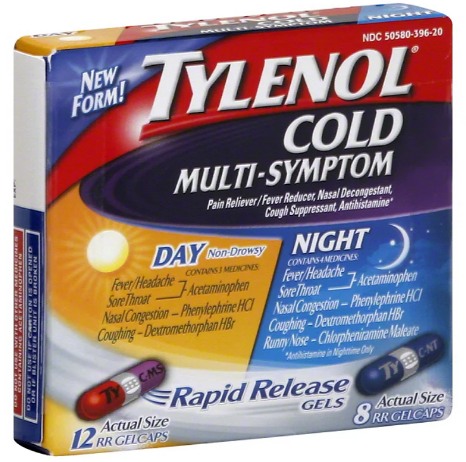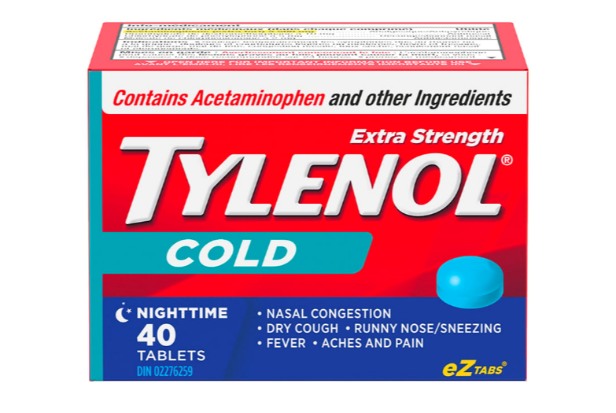The pharmacist discusses whether it is okay to take Tylenol Cold and Cough at the same time in our most recent question and answer.
You might be unsure whether it’s okay to give your child over-the-counter medication when they have a cold. To make wise decisions, adhere to these rules.
We really appreciate you getting in touch with us! Before combining medications that you don’t know are safe together, it’s always a good idea to do some research and ask questions.
I’m sorry to hear that your child is ill and experiencing some symptoms. I can understand wanting to give them some over-the-counter cough medicine to help.
Tylenol (acetaminophen) and Hyland’s 4Kids Cold & Cough are two medications that can be taken together without causing any negative side effects. They don’t appear to interact at all.
They may be taken the same day. or even within the same time frame with no ill effects.
Does Hyland’s 4Kids Cold & Cough Interact With Any Cough/Cold Medication?
The Hyland’s 4Kids Cold & Cough product in question is one of their homeopathic formulations, the majority of which are free of known drug interactions.
The specific ingredients contained in Hyland’s 4Kids Cold & Cough are:
- Allium Cepa 6X HPUS
- Hepar Sulph Calc 12X
- Hydrastis 6X
- Natrum Muriaticum
- Phosphorus 12X
- Pulsatilla 6X
- Sulphur 12X
In contrast to what I’ll refer to as traditional medications, such as Tylenol, homeopathic products contain ingredients that are extremely diluted and which, in higher concentrations, would actually cause the symptoms being treated. It is essentially based on the principle of “like treats like”.
For example, in homeopathy, a runny nose would be treated with a high dilution of a substance that normally causes a runny nose, like an onion. Hyland’s 4Kids Cold & Cough contains Allium Cepa, which is an onion extract.
Hyland’s 4Kids Cold & Cough contains only homeopathic, highly diluted ingredients. There are no ingredients in it that have been shown to interact with Tylenol or any other cough/cold medicine.

The Do’s and Don’ts of Cough and Cold Medicines
Sniffles, coughs, aches, and pains seem to be everywhere during the cold and flu season. The symptoms of a cold or the flu should be alleviated for everyone. However, given the variety of non-prescription product options, choosing the best one might seem overwhelming.
There are hundreds of items that claim to be able to treat your symptoms, and they are available in numerous packages and combos. Which choice is the most suitable for you? Understanding the different medication classes that can be used to safely treat your cold or flu symptoms is crucial.
If you are in the market for some relief, follow this list of dos and don’ts to help you decide which of these over-the-counter (OTC) medicines would help your symptoms:
- DO try to remember these classes of medicines that will best help to treat your cold or flu symptoms:
- Analgesics, or pain relievers, are used to help relieve fever, aches, and pains, such as a headache or sore throat. Common over-the-counter analgesics include acetaminophen (Tylenol), ibuprofen (Advil), and naproxen (Aleve), which are sold both separately and in products that also treat coughs and colds.
- Antihistamines may dry up secretions and relieve itchiness. Runny noses and watery eyes can benefit from these. Chlorpheniramine and diphenhydramine (Benadryl) are examples of medications.
- Cough suppressants may help to prevent you from coughing. These work best when you have a dry cough that won’t go away. Delsym and Robitussin DM both contain dextromethorphan, an OTC cough suppressant.
- Expectorants help you to clear mucous from your air passages. Therefore, try a product containing guaifenesin if you are coughing up thick yellow mucous. In the name-brand medications Robitussin and Mucinex, guaifenesin, an expectorant, can be found.
- Nasal decongestants are helpful in clearing up stuffy noses. The most effective decongestant is pseudoephedrine. It is the primary component of Sudafed. All pseudoephedrine products must comply with regulations to prevent misuse, so they are all kept with the pharmacist behind the pharmacy counter. Other over-the-counter nasal decongestant is phenylephrine. Afrin, Vick’s Sinex, and phenylephrine (Neo-Synephrine), two well-known nasal decongestant sprays, can also be beneficial.
- DO choose a medication that only addresses the symptoms you are feeling. To treat a wide range of symptoms, many products have several ingredients.
- DO keep in mind that some medical issues might make it impossible for you to use a medication safely. Because of this, it’s critical that you always tell your pharmacist if you have any ongoing medical issues, such as diabetes or high blood pressure.
- When you have a cold or the flu, DON’T forget to stay hydrated by drinking plenty of liquids. A fantastic expectorant is water, too!
- DO verify the recommended dosage on the label of each acetaminophen product, and abide by the daily maximum. That also means that you should refrain from taking two or more acetaminophen-containing medications simultaneously unless you’ve first spoken to your doctor or pharmacist. That’s because taking excessive amounts of acetaminophen has the potential to harm your liver. Click here for more details about this widely used medication.
- Remember to visit your pharmacist, please! He or she is always happy to assist you in identifying the medication that best addresses your symptoms.
You should be able to find and use a product safely so that you can get well if you follow these general guidelines when looking for a medication to help you fight the flu or a cold.
When Your Child is 4 Or Older
For children 4 and older, children’s cough and cold medications are regarded as safe. But the FDA recommends you follow these commonsense rules:
- Always read the package label and pay close attention to any instructions. These medications frequently contain multiple medications. Make sure not to give your child more pain reliever, fever reducer, or decongestant if you are giving them a cold medication that contains any of those ingredients. Your child could experience an overdose if they take too much medication.
- Never give your child more of a dose or give them more often than recommended on the label. Serious and potentially fatal side effects can result from taking too much.
- Don’t give children adult medications. Children should only take products marked for use in babies, infants, or children, sometimes called “pediatric” use on the package.
- The market is filled with a variety of organic and herbal treatments. If you are unsure or your child is under the age of 4, use caution and consult your doctor before using them.
- If you’re unsure whether a medication is appropriate for your child, consult a doctor. Recall that there are numerous different strengths of cough and cold medications.
- Share any additional medications your child is taking with their doctor. They can then see if the cold medicine is safe for them to use.
- Utilize the measuring tool that is included in the medicine package at all times. You can’t measure with a teaspoon from your kitchen.
How to Ease Symptoms Without Cold Medicines
There are other options besides cough and cold medications for treating your child’s symptoms. You can also try this:
- To treat body aches, take painkillers like children’s Tylenol (acetaminophen) or Motrin (ibuprofen). Ibuprofen should not be administered to infants younger than 6 months. Additionally, never give aspirin to a child due to the possibility of Reye’s syndrome, a rare but severe illness.
- To help them clear mucus from their nose, try saline drops. You might be able to bulb suction some of the mucous from your child if they are still young enough.
- Make sure your child drinks a lot of water. Their mucus is made thinner by it.
- Especially in the winter when the air is drier, use a humidifier in your child’s room to add moisture to the dry air.
- Consult a doctor if they wheeze or have asthma. To unblock swollen airways, your child may require prescription medication. Avoid giving cough and cold medications to kids with asthma because they can make the condition worse.
When Should I Call the Doctor?
The pediatrician should be contacted if your child’s symptoms worsen, such as breathing problems, or if they don’t go away in a week to rule out any other underlying conditions. An ear, sinus, or pneumonia infection may develop after a cold occasionally.
Final Words
We appreciate you contacting us again, and I hope your child feels better soon. Anything that comes up for you, we’re always here to help.



